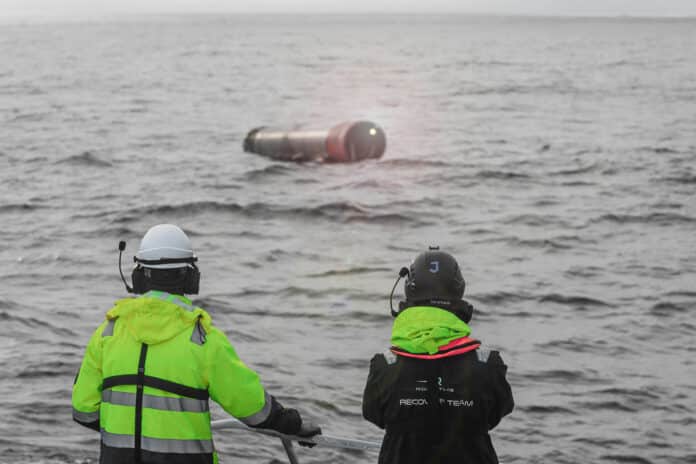Rocket Lab announced it is returning a previously flown Electron rocket first stage tank into the Electron production line for the first time in preparation for reflying the stage. This marks a significant milestone in Rocket Lab’s development program, as it brings the company closer to its goal of making Electron the world’s first reusable small orbital launch vehicle.
Rocket Lab has made significant progress in its efforts to make the Electron rocket reusable, as evidenced by the successful recovery of multiple first stages from previous missions.
Through a process that involves returning the boosters to Earth under a parachute, splashing them down in the ocean, and collecting them onto a specially modified boat for transfer back to Rocket Lab’s production complex, the company has been able to analyze the recovered stages extensively to inform an iterative development process. This has led to the first instance of a recovered booster tank being moved back onto the standard production line in preparation for reflight. The tank was recovered as part of the ‘Four of a Kind’ mission on January 31, 2024.
It has already passed more acceptance tests than any other recovered Electron stage, including tank pressurization test, helium leak check, and carbon fiber structural testing. The stage will now undergo final fit-out and rigorous qualification and acceptance testing to the same standard as a brand-new Electron tank to determine the recovered stage’s suitability for flight.
“Through an iterative development process, we have methodically perfected each step of Electron recovery while simultaneously continuing to increase our Electron production capacity and launch cadence. This is the exciting final piece of the puzzle before Electron goes reusable,” said Rocket Lab founder and CEO Peter Beck. “Our key priority in pushing this stage back into the standard production flow for the first time is to ensure our systems and qualification processes are fit for accepting pre-flown boosters at scale. If this stage successfully passes and is accepted for flight, we’ll consider opportunities for reflying it in the new year.”
Rocket Lab has been working hard to improve its recovery process ahead of its first flight. They have made iterative modifications across multiple missions, including ensuring the survival of Electron’s carbon composite structure during atmospheric reentry, refining the parachute system, honing telemetry and tracking systems, streamlining the stage collection process, and even successfully launching a previously flown Rutherford engine. They’ll be launching on the recovered stage once final acceptance and qualification testing is completed.
Last year in August, Rocket Lab achieved a major milestone when it flew a rocket with a reused Rutherford engine. While SpaceX is currently leading in the reusable rocket technology race, Rocket Lab could become the second company to join the exclusive club. The Starship program by Elon Musk’s SpaceX aims to take the technology to the next level. China’s state contractor is also not far behind and recently carried out engine tests on a reusable rocket engine.
